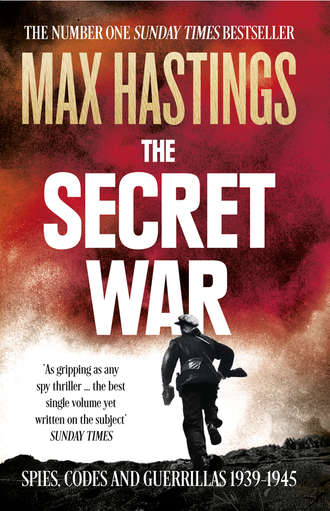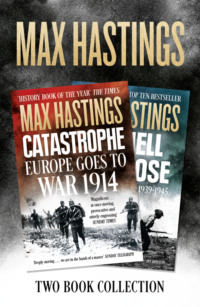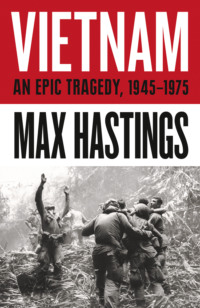
Полная версия
The Secret War: Spies, Codes and Guerrillas 1939–1945
In a nautical sense it may be true that nothing much happened, but relations on board were poisoned by the mutual loathing of Walter and Fred, while Jim was perpetually prostrate with sea-sickness, which cost him a drastic weight loss. The passengers were successfully delivered to a reception committee of Argentine sympathisers at Rio del Plata, who presented the Passim’s crew with coffee and oranges before the little vessel turned about and sailed home. Garbers, plainly a man of iron, seemed wholly untroubled by his experiences. He returned safely to Europe and received the Ritterkreuz. There is no evidence, however, that his passengers contributed anything to the Nazi war effort. Likewise, the Hungarian air force officer Count László Almásy crossed 2,000 miles of North African desert to deliver two agents to Egypt in May 1942, a remarkable achievement, and Almásy later inspired the novel and film The English Patient, though its version of this enthusiastic Nazi was fanciful. His passengers, however, did nothing on arrival to justify their epic journey. Nearer home, it became increasingly clear to the British monitoring the Abwehr’s wirelessed reports that its network of overseas stations and informants produced almost nothing that was both new and true.
As Trevor-Roper pursued his researches through the ever-growing harvest of Bletchley decrypts, ‘We soon became aware that “the little Admiral” was a far more complex and controversial character than we had supposed. As the incompetence of his organisation was progressively revealed to us, we discovered, or deduced, something of the politics in which he was involved, and we noted his feverish travels, in every direction, but especially to Spain, which distinguished him sharply from our own more sedentary chief’ – Stewart Menzies. For several decades after the war, Canaris was treated as a major figure of the era, the subject of several weighty biographies. The foremost element in the Canaris mythology was a claim that he had been a secret crusader against Hitler, who had given active assistance to the Allied cause. Several German writers energetically promoted this view, because their post-war society was desperate to identify virtuous men who had dared to raise their hands against the vast evil of Nazism, and suffered martyrdom in consequence.
It is now plain that such claims were unfounded. Until 1938 Canaris was an ardent supporter of the Nazis, and for years thereafter Hitler frequently used him as a personal emissary abroad. The admiral worked amicably with Reinhard Heydrich of the RSHA. The two families socialised: Frau Canaris and the executive planner of the Holocaust sometimes played the violin together. From 1939 onwards, the admiral became increasingly gloomy and nervous – colleagues noted him drinking heavily. Trevor-Roper regarded it as an absurd delusion that Canaris was the directing brain of ‘the other Germany’. The Abwehr’s chief, in his view, was a man of limited gifts, who confined his anti-Nazi activities to making his organisation a haven for officers who shared his rising distaste for Hitler and his supporters, and who resisted active complicity in the Nazis’ atrocities. Canaris’s fastidious nature recoiled from the coarseness of their conduct, perhaps more than from its insensate barbarity.
The only Abwehr officer known to have been a source for MI6 was Hans-Berndt Gisevius in Switzerland, a Prussian lawyer of giant physical proportions who served five years in the Gestapo and hated it, before transferring to the Ministry of Internal Affairs in 1938 and thence to the Abwehr. Canaris sent him to Zürich under diplomatic cover as vice-consul, and thereafter he passed information to Halina Szymańska, whom he knew was an informant for both British and Polish intelligence. Gisevius provided material for twenty-five reports dispatched from Bern to Broadway between August 1940 and December 1942, some of them citing Canaris’s professed opinions; also among his sources was Hitler’s finance minister, Hjalmar Schacht.
Szymańska, the conduit, was the formidable and beautiful wife of the former Polish military attaché in Berlin, and once dined with Canaris in Bern. Much of Gisevius’s material was accurate: in January 1941 Szymańska passed on his report about German aircraft stocks, together with the Abwehr man’s opinion that an invasion of Britain was ‘off’. In April she quoted Gisevius’s view, based on information from Schacht, that Hitler would invade Russia during the following month – which indeed was then his intention. But, as usual with intelligence, the German also passed on some rubbish: on 28 March 1941 he told Szymańska that German forces would not take the offensive in Libya – two days before Rommel launched a major onslaught.
Gisevius’s contribution, and those of a handful of his colleagues, scarcely made the Abwehr a pillar of Resistance against the Nazis. Its wartime shortcomings were the product of indolence and incompetence rather than of considered treachery. Canaris was a poor delegator, who chose weak subordinates. German intelligence had one notable success abroad, in suborning Yugoslav officers ahead of their army’s 1941 emergency mobilisation, in time to sabotage the process, but thereafter its espionage operations were uniformly unsuccessful. The admiral was nonetheless too much a German patriot actively to assist his country’s enemies. Like many such people of the time, he harboured muddled political views. A monarchist and a conservative, Franco’s Spain was his spiritual home; he travelled there as often as he could, not merely to visit the large Madrid Abwehr HQ at Calle Claudio Coello 151, but also to commune with like-minded Spanish politicians and grandees. The Abwehr’s ship-watching service in Spain, the Unternehmen Bodden, monitoring Allied movements through the Straits of Gibraltar with the aid of advanced infra-red technology, and reporting them to the Kriegsmarine and the Luftwaffe’s Air Fleet 1 in Italy, formed the most impressive element in the organisation’s overseas operations.
Yet if Canaris bears much responsibility for the shortcomings of Germany’s ‘big picture’ intelligence, he could never have run an honest operation under the dead hand of Hitler, any more than Moscow Centre could do so in the shadow of Stalin. Reports on the condition and prospects of the enemy were permitted to reach conclusions only within parameters acceptable to the Führer. This crippling constraint was symbolised by Hitler’s annotation on an important intelligence report about Russian agricultural conditions: ‘This cannot be.’ Kurt Zeitzler, chief of the army general staff, wrote on 23 October 1942, the eve of Stalingrad: ‘The Russians no longer have any reserves worth mentioning and are not capable of launching large-scale offensives.’ Himmler in 1944 declared without embarrassment that his first requirement from Germany’s intelligence services was not truth, but loyalty to the Führer. This was an important statement, the most vivid expression of the huge weakness of the Abwehr and the RSHA throughout the Second World War.
Historian Michael Handel has written: ‘Leaders in a democratic system are generally more inclined to consider a wide variety of options than those who have always functioned within authoritarian or totalitarian political systems. In authoritarian countries, where the climb to the top is an unrelenting struggle for power, habits of cooperation and openness are usually less developed … Tolerance for ideas that deviate from the “party line” … are seen as personal criticism.’ These features of almost all dictatorships crippled German intelligence activities beyond the battlefield, and sometimes also within it. Himmler’s deputy Reinhard Heydrich, for instance, was far more interested in using the RSHA as a weapon against the Nazi empire’s internal enemies than as a means of securing information about its foreign foes. Hitler never wished to use intelligence as a planning or policy-making tool. He recognised its utility only at a tactical level: the Nazis were strikingly incurious about Abroad.
Yet the fact that the Abwehr was an unsuccessful intelligence-gathering organisation did not mean that Hitler’s armed forces were blind on the battlefield: their access to tactical intelligence was generally good. In the first half of the war Germany’s wireless interceptors and codebreakers enjoyed successes which would today seem impressive, were they not measured against those of the British and Americans. The Wehrmacht had excellent voice-monitoring units, which in every theatre of war provided important information. ‘The Y Service was the best source of intelligence,’ said Hans-Otto Behrendt, one of Rommel’s staff in North Africa. In August 1941, aided by an Italian employee, two agents of the Sezione Prelevamento – the ‘extraction section’ of Italian intelligence – opened the safe of the military attaché’s office at the US embassy in Rome. They removed his codebook – Military Intelligence Code No. 11 – and photographed it. This enabled the Axis to read substantial traffic through the ensuing ten months, and proved a seriously significant intelligence break. In 1942 it had especially grievous consequences for Eighth Army in the desert, since the US military attaché in Cairo, Col. Bonner Fellers, reported in detail to Washington on British plans and intentions. A German intelligence officer paid generous tribute to ‘this incomparable source of authentic and reliable information, which … contributed so decisively during the first half of 1942 to our victories in North Africa’.
At sea, some of the Royal Navy’s ciphers were found aboard the British submarine Seal, captured off the German coast on 5 May 1940, owing to an extraordinary and culpable failure by the minelayer’s officers to destroy its confidential papers. The Kriegsmarine was able to read much of the Royal Navy’s North Sea traffic until August 1940, and some warship communications until September 1941. Throughout the first half of the war, the Kriegsmarine’s B-Dienst read the Royal Navy’s convoy codes, with grievous consequences for Allied shipping losses. Even where signals could not be decrypted, radio-traffic analysis enabled Axis intelligence staffs to judge enemy deployments remarkably effectively, at least until the second half of the war, when Allied commanders became more astute and security-conscious. Patrolling, air reconnaissance and PoW interrogations all provided streams of useful data to German operational commanders, as did open-source information – enemy newspaper and broadcast monitoring.
In the first phase of the war until 1942, while the Wehrmacht was triumphant on battlefields across Europe, these sources sufficed to tell its commanders all that they felt they needed to know about the world, and about their enemies. Victories masked the abject humint failures of the Abwehr. As long as Germany was winning, why should anyone make trouble about imperfections in the war machine? It was only when Hitler’s armies started losing that hard questions began to be asked about the Reich’s abysmal political and strategic intelligence. Hitler himself was, of course, much to blame, but Canaris exercised operational responsibility. The admiral fell from grace, though it was by then far too late – probably impossible, for reasons institutionalised in the Nazi system – to repair his corrupt and ineffective espionage organisation.
While anxious not to be a bad man, Canaris lacked the courage to be a good one. Far from being a substantial historical figure, he was a small one, grappling with dilemmas and difficulties far beyond his capabilities. Trevor-Roper professed to see a close resemblance between the admiral and Menzies, his British counterpart. Both men were conservative, honourable – and weak. By a trifling coincidence, Canaris had a mistress in Vienna whose sister was married to Menzies’ brother. Trevor-Roper came to regard the Abwehr as ‘a mirror image of [MI6], with many of the same weaknesses and absurdities … I recognised, across the intervening fog of war, old friends of Broadway and Whaddon Hall transmuted into German uniform in the Tirpitz Ufer or at Wannsee.’ The admiral did little to merit his eventual fate at the hands of Hitler’s executioners: he frequently talked treason, but did nothing to further it. Far from becoming a martyr to the cause of a ‘good Germany’, he was merely an incompetent servant of an evil one.
3
Miracles Take a Little Longer: Bletchley
1 ‘TIPS’ AND ‘CILLIS’
In the winter of 1939, MI6 came under scrutiny and fierce criticism within Whitehall, intensified by the Venlo fiasco. Stewart Menzies, knowing the precariousness of his position as ‘C’, compiled a twenty-six-page document defending his service, in which he risked playing one card which might – and did – save his bacon. He promised his masters that the country was ‘about to reap the fruits’ of MI6’s liaison with Allied secret services in a fashion ‘which should be of inestimable benefits to the Air Ministry within a few weeks, and probably to the Admiralty within a month or two’. The significance of this vaguely expressed claim was that Menzies believed that Bletchley Park, with the help of the French and Poles, was close to cracking some German ciphers. Such successes could go far indeed towards compensating for MI6’s humint failure. His expectations would remain unfulfilled for much of the year that followed. Few even within the intelligence community dared to hope that Britain could emulate, far less surpass, the 1914–18 triumphs of Room 40. Admiral Godfrey, head of naval intelligence, wrote to Menzies on 18 November, saying that ‘whether or not Cryptanalysis will ever again give us the knowledge we had of German movements in the late war’, MI6 should exert itself to plant agents in enemy ports to report shipping movements. Godfrey did not seem to expect much from the codebreakers.
In peacetime, few nations commit their finest brains to national security. Brilliant people seldom choose careers in intelligence – or, for that matter, in the armed forces. A struggle for national survival alone makes it possible for a government to mobilise genius, or people possessing something close to it, in the interests of the war effort. The British, and latterly the Americans, did this more effectively than any other participants in World War II. A remarkable proportion of their nations’ brightest and best sooner or later found themselves performing tasks worthy of their talents – in higher army staff posts alongside the likes of Enoch Powell, John Freeman, Toby Aldington; in scientific or technical research; and especially in intelligence, which absorbed thousands of outstanding intellects from many walks of life. The outbreak of war enabled the German section of British military intelligence, for instance, to recruit such writers and academics as Noel Annan, Eric Birley and Alan Pryce-Jones. Annan, a Cambridge don who had only a passable acquaintance with German and French, observed wonderingly: ‘Within a week I was piecing together the reports of agents in the Balkans and the early stutterings of Ultra.’
Donald McLachlan, a journalist who served under Godfrey at the Admiralty, afterwards argued that all wartime intelligence departments should be run by civilians in uniform, because they are unburdened by the lifetime prejudices of career soldiers, sailors and airmen: ‘It is the lawyer, the scholar, the traveller, the banker, even the journalist who shows the ability to resist where the career men tend to bend. Career officers and politicians have a strong interest in cooking raw intelligence to make their masters’ favourite dishes.’ MI6 remained until 1945 under the leadership of its old hands, but most of Britain’s secret war machine passed into the hands of able civilians in uniform who – after an interval of months or in some cases years while they were trained and their skills recognised – progressively improved the quality of intelligence analysis. The Admiralty’s Submarine Tracking Room was directed by Rodger Winn, a barrister and future judge. Gen. Sir Bernard Montgomery’s chief of intelligence from Alamein to Luneburg Heath was the Oxford don Edgar ‘Bill’ Williams, latterly a brigadier. Reg Jones made himself a legend in scientific intelligence.
These men, and a few hundred others throughout the armed forces, spent much of the war exploiting and assessing information derived overwhelmingly from interception and decryption of the enemy’s wireless traffic. Bill Williams, who served in the Mediterranean until 1943 and in Europe thereafter, stated in an important 1945 report: ‘It must be made quite clear that Ultra and Ultra only put intelligence on the map.’ Until decrypts began to become available in bulk in 1942, ‘Intelligence was the Cinderella of the staff … Information about the enemy was frequently treated as interesting rather than valuable [though] of course this attitude varied according to the commander.’
Scepticism was often merited, because much material was downright specious. The 1940 war diary of the army’s Middle East intelligence section in Cairo included comically frivolous snippets: ‘All Hungarian cabaret artistes have been ordered to leave the country by the end of May.’ Data about the Italian army was scanty, so that on 9 August the section recorded: ‘The present location and organisation of Libyan troops in Eastern Cyrenaica is obscure.’ A despondent staff officer added a week later: ‘There has been no further reliable information of fresh [Italian] ground units or formations arriving in Libya from overseas.’ On 27 September, the British high command’s weekly intelligence summary included a paragraph on domestic conditions in Germany: ‘A neutral traveller to the Leipsic fair, whose personal observations are believed reliable, reports that relations between the [Nazi] Party and the Army are not good.’ Three months later, the head of MI6’s Political Section wrung his hands: ‘It is piteous to find ourselves in this state of ignorance’ about both Germany’s internal condition and economy.
Only when Allied warlords were empowered to read the messages being exchanged between enemy generals in the field and their higher headquarters was scepticism about the value of ‘intelligence’ replaced by increasingly fervent belief. Ultra forced commanders-in-chief, not to mention the prime minister, to treat senior intelligence officers with a respect they had seldom received in the pre-Bletchley universe. Brigadier Ian Jacob of the war cabinet secretariat said: ‘My impression is that once the Ultra business got well-established, Churchill didn’t look at anything else.’ Eisenhower’s intelligence chief Kenneth Strong wrote in 1943, in a memorandum on training staff officers: ‘We no longer depend on agents and cloak-and-dagger sources for our information. Modern methods have completely transformed intelligence.’
He meant codebreaking, of course, and in Britain the fountainhead of such activity was the Government Code & Cypher School at Bletchley. In the months following the outbreak of war, GC&CS expanded dramatically with the arrival of a stream of academics, many of them earmarked by its recruiters before the war. Though some were seconded from the armed forces, it was understood that there was no need to train the universities’ contingent to march, blanco webbing, and name the parts of a rifle. They remained their sallow, tweedy, pipe-smoking young selves when housed in lodgings around the dreary suburban town, and enlisted on the government payroll without uniform or ceremony. Twenty-year-old mathematician Keith Batey found his landlady demanding an assurance from his employer that he was not a despised ‘conchy’ – conscientious objector – before he joined the growing body of academics working on a task of supreme importance to their country, fulfilment of which might do something to assuage its shocking vulnerability. What was the task? Bletchley’s little band, 169 strong in 1939 including support staff, understood only that the nation’s enemies communicated in a multitude of codes and ciphers, vulnerable to interception. If even a portion of these combinations of numbers and letters could be rendered intelligible, information might be gained of priceless value to the war effort.
Nobody knew, in the beginning, whether a given message hijacked from the airwaves might be an order from Hitler for his armies to march on Warsaw, or a request from a Luftwaffe airfield in eastern Germany for a delivery of filing cabinets. Ahead of the codebreakers lay a mammoth menu of requirements which could only be addressed as mobilisation sluggishly made available ears, brains and hands to monitor the enemy’s frequencies around the clock, log some of his vast output of messages, fix the locations and possible identities of the senders – diplomatic, police, military, naval or air force. Then came the much greater challenge, of discovering what the messages meant.
All radio communications involved a trade-off between speed and security. At the simplest level, battlefield direction by land, sea and air required some voice linkage. This enabled the instantaneous passage of orders and information, at the cost of being overheard by anybody else who cared to tune to a given frequency. Crude security could be introduced by using coded callsigns in place of names and suchlike – during the Battle of Britain fighter controllers added 5,000 feet to indicated altitudes, to confuse eavesdroppers. But voice messaging was inherently insecure: sensitive information should never be passed verbally, though it often was.
Most military messages were instead wirelessed by Morse key. Low-level material could be rapidly encrypted under battlefield conditions by relatively unsophisticated personnel using so-called hand- or field-ciphers, usually involving groups of two or three letters or numbers – the Kriegsmarine employed twenty-seven variants. More sensitive traffic, issuing from higher echelons, was translated by machine-generated or manual ciphers, usually involving combinations of four or five letters or numbers. The British thought justifiably highly of the security of their Type-X machines, though they never had enough of them.* The Americans rightly trusted their Sigaba, a fifteen-rotor system.
For substantial periods between 1939 and 1943 the Germans broke some Allied codes, including those of the US State Department and military attachés, along with the traffic of several exile governments, notably the Poles and Free French. They sometimes also accessed messages of all three British services, including the RAF’s four-character cipher, and later had successes in attacking products of the US Army’s M-209 field-ciphering machine. It deserves emphasis that Allied code-security weaknesses, and enemy achievements in exploiting them, gave the Germans much more operational assistance than some Western historians acknowledge, especially in the Battle of the Atlantic. However, higher British, American and Russian communications defied enemy scrutiny: Nazi eavesdropping on transatlantic telephone conversations between Churchill and Roosevelt told Berlin little of value. Modern claims that the Germans broke into Russian higher ciphers deserve to be treated with caution: certainly from 1942 onwards, there is no evidence that Hitler’s generals profited from any such insights; if they had, they would have been less often deluded by Soviet deceptions.
Most German senior officers – though by no means all their cryptographers – were confident that Enigma ciphering machines, which scrambled messages by means of shifting rotors and a plugboard, and rendered them comprehensible only by a matching machine with identical settings, were immune to the attention of any enemy, and indeed to the workings of the human brain. It is unsurprising that in 1939 they discounted the possibility that electro-mechanical technology might dramatically accelerate exposure of the Enigma’s secrets, because it did not then exist. It is extraordinary, however, that such serene confidence persisted through six years that followed, even following the discovery that the Poles had broken some pre-war Enigma traffic, and several warnings from their own experts. Amazing hubris was expressed by the Wehrmacht’s last signals chief, Lt. Gen. Albert Praun, who preened himself before his Allied captors after the war ended: ‘The achievements of German communications intelligence … may speak in favour of the German type of intelligence organisation.’ His organisation, he said, ‘gave German commanders a hitherto unattained degree of [signal] security’.








